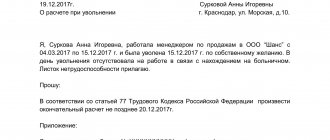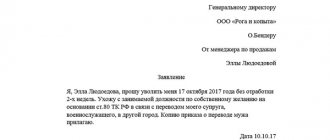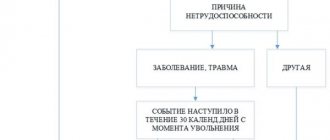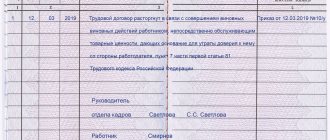Author of the article: Roman Gavrilov Last modified: January 2021 46459
Dismissal from the Ministry of Internal Affairs is considered one of the grounds for termination of service in law enforcement agencies. An employee of the police or other internal affairs bodies also has the right to suspend public service on the grounds specified in Art. 37 Federal Law No. 342 of November 30, 2011
Art. 80 Labor Code of the Russian Federation
The grounds for termination of service may be dismissal or death of an employee (more details).
Art. 81 Labor Code of the Russian Federation
Dismissal is made through termination of the contract (more details).
Art. 82 Labor Code of the Russian Federation
The contract is terminated on the basis of termination, the employee reaching the maximum age of service, length of service, at the initiative of the employee, by agreement of the parties, in connection with a change in the terms of the contract and the subsequent refusal of the police officer to work according to the new rules (more details).
Art. 84 Labor Code of the Russian Federation
An employee who decides to resign must submit a corresponding report one month before the date of termination of the contract (more details).
Grounds for dismissal of a pensioner
Let us immediately note that labor legislation does not provide for separate grounds for terminating employment relations with persons who have reached retirement age and continue to work in organizations of any form of ownership (or for individual entrepreneurs).
The main reasons when a contract can be terminated are determined by the Labor Code (Article 77).
Let's look at the most common of them in more detail. We will answer whether a pensioner can be fired from work.
On the initiative of the authorities
From the point of view of the law, if there are grounds to part with a subordinate at the initiative of the employer, there are no exceptions for pensioners.
In general, a working pensioner will be dismissed:
- if the enterprise is liquidated if it is declared bankrupt or by decision of the owner;
- when a reorganization is taking place and a reduction in headcount or staff is planned;
- after certification indicating an insufficient level of qualifications, if a discrepancy is revealed for the position held;
- if he holds a management position and the owner of the enterprise has changed;
- there have been repeated comments and reprimands for violation of labor discipline;
- for gross violations of discipline even in isolated cases (truancy, drunkenness, etc.);
- in other situations provided for by the provisions of Art. 81 Labor Code of the Russian Federation.
If a subordinate is dismissed by the owner (or manager), related only to his age, you can appeal the employer’s actions:
- to supervisory authorities - the territorial labor inspectorate at the place of registration of the legal entity (actual location of the entrepreneur), the prosecutor's office;
- directly through the court.
At the discretion of the pensioner
You can always terminate your employment relationship at your own request.
The law requires that you give your employer at least two weeks' written notice of your intention to leave your job.
Moreover, if during the working period the employee changes his mind about resigning, you can withdraw the application, unless another person was invited to fill the vacant position by transfer from a third-party organization.
Also, if at the end of the two-week period he continues to perform his job duties without insisting on registration of dismissal, the employment relationship remains in force.
According to the third part of Art. 80 of the Labor Code of the Russian Federation, the law makes an exception for persons resigning due to retirement. The employer must issue a full payment to them without forcing them to work.
By agreement of the parties
The law (Article 78 of the Labor Code of the Russian Federation) allows early termination of employment relations if the parties were able to agree and do not have any claims.
In this case, the dismissal of a working pensioner at the initiative of the employer can also only be after receiving his consent.
Both the employer and the subordinate can offer conditions beneficial to each party.
It is not necessary to draw up a written agreement stipulating the implementation of certain points. It is enough to indicate in the resignation letter the agreement of the parties as the basis.
Practice shows that employees often use this if they do not want to, or due to circumstances cannot, stay behind to work the required two-week period.
Violators of labor discipline also agree with this formulation in order to peacefully part with the employer without spoiling their reputation in the work book.
The procedure for writing a report on the dismissal of an employee from the Ministry of Internal Affairs
The form for submitting the report is written. The report is drawn up in the name of the immediate head of the unit.
The document states:
- Full name, position, title of chief;
- Full name, position and title of the employee;
- request for dismissal on a specific date;
- refusal or consent to undergo an IHC examination;
- reason for leaving the structure of the Ministry of Internal Affairs;
- request for a full settlement (according to Article 140 of the Labor Code of the Russian Federation)
- request for documentation;
- applicant's signature.
Expert commentary
Leonov Victor
Lawyer
If the dismissal is formalized on the initiative of the internal affairs bodies, the basis for termination of the service contract is based on established facts of improper behavior of an internal affairs employee and violation of official discipline. Dismissal can be determined on a specific date.
An employee's responsibilities may include:
- work a certain amount of time;
- bring the “thing” to the end;
- other immediate functions.
Important! An employee of internal affairs bodies has the right to be reinstated in his position if the dismissal was carried out on illegal grounds. To do this, you will need to file an administrative claim.
The most common grounds for filing claims for reinstatement are employee indications of:
- applying pressure;
- incorrect determination of the date of dismissal;
- failure to make final payments on the day of dismissal.
Termination of a service contract may be due to:
- with abuse of local power;
- conflicts related to the subordination of officials.
The employee’s housing and other property rights, for example, the right to housing, subsidies and other incentive measures, are also subject to protection.
Controversial situations may arise if the dismissal of an employee is related to his criminal prosecution. It is advisable to entrust the protection of the rights of an official to a qualified lawyer with extensive experience in conducting administrative cases.
Rights and benefits of a working pensioner
Speaking about whether a pensioner can be fired without his consent due to his advanced age, the answer is a categorical no.
It remains only the right of the person himself to continue working or retire. The situation is similar when it comes to the employment of retired people.
For example, a person, having left an enterprise and taken out a pension, decided after some period of time that he did not want to sit idle at home. Most often, the purely material side of the matter forces one to make such a decision; sad as it may be to state, this remains a fact.
If there is a vacancy, an employer does not have the right to refuse to employ a pensioner on the basis of his age.
Otherwise, this will be recognized as a gross violation of labor legislation - discrimination of human rights. To protect your interests, you can file a claim with the courts. Naturally, normal labor relations with this employer are unlikely to develop in the future.
Additional benefits are evidence that the legislator provides for the right to continue working while receiving a pension.
In Art. 128 of the Labor Code of the Russian Federation enshrines the right of a working pensioner:
- during the calendar year, in addition to the mandatory annual paid vacation, take an additional free vacation of up to 14 days at any convenient time.
- If a pensioner is recognized as disabled, the employer is obliged, at the request of the employee, to provide him with additional rest for up to 60 calendar days.
Note that additional leave can be used immediately or divided into parts. In this case, the remaining unused days are not carried over to the next calendar year.
Is it possible to quit without working?
A month passes from submitting a report to dismissal. By agreement with management, this time period may be shortened. Before the expiration of the mandatory service period, an employee may be released from his duties only with the permission of the manager.
By mutual agreement of both parties, the employment relationship can be terminated by specifying a specific date of dismissal.
Early departure from a position may be facilitated by retirement or the inability to continue to perform duties. In these cases, the date of termination of the contract is indicated by the employee. The date must be indicated in the report, otherwise the payment will occur after 30 days. Circumstances that hinder further work include:
- The need to care for a relative of retirement age, or a disabled person of group 1 or 2. There must be a medical and sanitary expert opinion.
- Medical conditions that interfere with the performance of official duties. Condition for dismissal: it is not possible to transfer the employee to a more suitable place.
- Caring for a minor child who is being raised by an employee of the Ministry of Internal Affairs alone.
If a police officer has not been paid off after the expiration of his mandatory service, he has the right not to go to work. If the money is not paid, the person can file a lawsuit. The following may also be grounds for filing a claim:
- pressure from superiors;
- incorrect determination of the date of dismissal;
- absence or incomplete payment.
Does the owner have the discretionary power to fire retirees?
The very fact that a person has the right to retire upon reaching the age established by law cannot serve as a reason to force him to resign if:
- he doesn’t want it himself;
- for medical reasons, is able to perform work duties;
- there are no justified reasons to fire him on the initiative of management.
What payments are due?
On the last day of handing over the authority, a full payment of funds is issued, which includes the following accruals:
- Unpaid salary for the current month, up to the last day of resignation. It is calculated simply: the amount of salary and monthly payments is divided by the average number of days per month and multiplied by the number of calendar days at the time of dismissal.
- Compensation for unused vacation if the employee does not want to take time off before dismissal.
- The quarterly bonus is proportional to the time worked.
- A one-time benefit, if the period of service in the Ministry of Internal Affairs is 20 years or more, then in accordance with the Federal Law of November 19, 2011 No. 247-FZ “On social guarantees for employees of internal affairs bodies of the Russian Federation and amendments to certain legislative acts of the Russian Federation” is paid in the amount of seven salaries. If the period of service in the Ministry of Internal Affairs is calculated for a shorter period, then the one-time benefit is two salaries.
- The salary for a special rank is paid for one year to employees with less than 20 years of service in the Ministry of Internal Affairs.
In the event that a police officer resigns of his own free will due to a change in his physical state of health, he is paid severance pay.
The amount of severance pay will depend on the number of years of service of the employee:
- length of service is up to 10 years - five salaries per month;
- length of service is calculated at 10 – 15 years – 10 monthly salaries;
- length of service is from 15 to 20 years - 15 salaries;
- experience is more than 20 years - 20 monthly salaries.
According to Article 84 of the Federal Law “On Service in the Internal Affairs Bodies”, an employee who received education at the expense of public funds, with the condition that he will work under a contract in the Ministry of Internal Affairs, will have to return the public funds spent on him. The amount is calculated proportionally based on the remaining years that he did not serve.
There will be no need to reimburse training costs if:
- The employee cannot perform duty for medical reasons. A medical report must be provided.
- An employee must constantly care for a close relative of retirement age or a disabled person of group 1 or 2. To do this, you need to provide a medical examination report.
- The employee is raising a minor child alone and requires care.
We talked about how the final calculation of all due payments occurs during a regular dismissal at the initiative of an employee in a separate article.
Nuances
With an employee who has indicated in the application a specific desire to leave work due to retirement, the contract must be terminated on the date specified by him.
In what cases is a pensioner fired with service?
There are differing opinions on the legality of the requirement to work off when dismissing a pensioner who got a job after he had already taken a well-deserved rest.
By all logic, he cannot retire again, since he has already applied for it, and he himself has expressed a desire to work again.
On the other hand, this may be regarded as the impossibility of continuing to work further.
We must pay tribute to the fact that, as a rule, if the decision to resign by a working pensioner is made on his own initiative, employers do not force him to work, even if the person got a job after retirement.
But, if the employer formalizes the dismissal 2 weeks after the pensioner’s application, this is not considered a violation of the law.
When can't you leave?
According to Article 35 of the Federal Law “On Service in the Department of Internal Affairs” there is a list of reasons that do not allow an employee of the Ministry of Internal Affairs to resign of his own free will :
- martial law or a state of emergency has been declared;
- an armed conflict has arisen or counter-terrorism operations are being carried out;
- liquidation of emergency consequences is carried out.
On our website there are other useful publications not only on the topic of voluntary dismissal of police officers, but also of ordinary civilians. From them you will learn:
- How to correctly formulate the reasons for dismissal and what to do if the employer refuses to sign the application?
- Is it always possible to withdraw an application and what to do if at work you are forced to leave of your own free will?
How does a pensioner retire on his own initiative?
Having received a statement indicating that the employee wants to leave his job due to retirement, the employer:
- issues an order;
- makes an appropriate entry in the work book;
- prepares mandatory accounting statements;
- makes a full payment and issues documents within the time period specified upon application.
If a working pensioner indicates only his own desire as the reason for dismissal, the contractual relationship will be terminated after a two-week period.
Compliance with the requirements for dismissal at the initiative of superiors
In order to avoid conflicts, the employer is obliged, despite the fact that the person being dismissed is, in fact, a pensioner, to carry out all mandatory procedural measures, using the right to terminate the employment contract unilaterally.
For example, when dismissing an employee “under an article” for absenteeism, it is necessary to demand a written explanation from the culprit. Only after two days, if the employee does not provide supporting documents and a written explanatory note, it is possible, after drawing up the appropriate act, to issue a dismissal order.
Moreover, it is impossible to formalize dismissal while a person is on vacation, undergoing treatment or undergoing a rehabilitation period.
Also, do not forget that prosecution can be made within a month after the day when the violations became known and the employee’s guilt was proven, if the violation of the terms of the employment contract itself occurred no more than six months ago.
The only exceptions are cases where guilty actions are identified during an audit or audit.
In such situations, the employee may be dismissed as a disciplinary sanction for misconduct committed within the previous two years.
Dismissal of pensioners due to staff reduction
First of all, we note that it is impossible to dismiss an employee due to redundancy simply by referring to his retirement age and the payments received.
When an enterprise is liquidated (by decision of the owner or by a court declaring bankruptcy), it is clear that all employees will be fired.
If the employer decides to reduce the number of workers or staff, the issue of selecting candidates eligible for dismissal is approached more scrupulously.
They take into account the length and experience of employees, their attitude towards fulfilling their job duties. Most often, the advantage in remaining at work from this point of view remains with the working pensioner.
But, if, for example, there is a choice of who to keep at work if it is necessary to reduce the staffing position - a mother of two children or a working pensioner, naturally, even with all the advantages of the latter, it will be he who will be laid off.
This is understandable, since there is an additional source of income.
Other privileges guaranteed by law are taken into account.
In any case, the following procedural rules must be followed:
- at least two months before formalizing the dismissal, the selected candidates must be notified in writing, against personal signature, of the upcoming layoff;
- if there are vacancies, the employee must be offered a transfer;
- in case of refusal to transfer (in the absence of suitable vacancies), the employment relationship with the employee is terminated.
Orders of dismissal from the police
The procedure for submitting employees of the internal affairs bodies of the Russian Federation for dismissal from service in the internal affairs bodies of the Russian Federation and processing documents related to the termination or termination of the contract for service in the internal affairs bodies of the Russian Federation, dismissal from service in the internal affairs bodies of the Russian Federation and exclusion from register of employees of internal affairs bodies of the Russian Federation
With changes and additions from:
March 12, 2014, June 28, 2021
1.
This Procedure determines the procedure for submitting employees of the internal affairs bodies of the Russian Federation * (1) for dismissal from service in the internal affairs bodies of the Russian Federation * (2) and processing documents related to the termination or termination of the contract for service in the internal affairs bodies * (3) , dismissal from service in internal affairs bodies and exclusion from the register of employees.
2. The employee is dismissed from service in the internal affairs bodies due to the termination or termination of the contract *(4).
3. Termination or termination of a contract and dismissal of an employee from service in internal affairs bodies are carried out on the grounds provided for in Article 82 of the Law on Service.
If there are simultaneously several grounds for termination or termination of a contract and dismissal of an employee from service in internal affairs bodies, provided for in Part 1, paragraphs 1, 3, 4, 8, 9, 11, 12 and 16 of Part 2 and paragraphs 1 and 3 of Part 3 of the article 82 of the Law on Service, the contract is terminated or terminated on one of these grounds at the choice of the employee in accordance with the report submitted by him * (5).
4. Termination of the contract and dismissal are carried out:
4.1. Minister of Internal Affairs of the Russian Federation*(6):
4.1.1. Employees relieved of positions of senior management by decree of the President of the Russian Federation.
4.1.2. Employees with a special rank of senior management and filling positions of senior management.
4.1.3. Employees filling positions appointed by the Minister.
4.1.4. Employees seconded to federal executive authorities, other government bodies or organizations.
4.1.5. Employees with the special rank of police colonel, internal service colonel, justice colonel.
4.1.6. Employees whose dismissal is carried out in execution of a disciplinary sanction imposed on them by the Minister.
4.2. Deputy Ministers:
4.2.1. Employees filling positions, appointment to which is made by Deputy Ministers.
4.2.2. Employees whose dismissal is carried out in execution of a disciplinary sanction imposed on them by the Deputy Minister.
When can you be fired based on length of service?
The changes made to pension legislation did not affect benefits for people who worked in special, harmful, and dangerous conditions for health and life.
If they have sufficient special and general insurance experience, they will be able to retire earlier.
Monthly pension payments are assigned and paid in the presence of special length of service (according to length of service):
- without taking into account the actual state of working capacity;
- persons under the established age for the right to receive an old-age pension.
If you are in doubt whether a pensioner can be fired without his consent based on length of service, you can turn directly to industry agreements.
Legal and legislative acts indicate that in this case there must be an initiative of the person who has received the right to early leave.
Calculation with a working pensioner upon dismissal
Regardless of the reasons for the termination of employment relations with a working pensioner, on the last working day they are required to pay him in full and pay all amounts due:
- earnings for the time actually worked from the date of the last payments;
- in the case of remaining unused days of paid leave - monetary compensation based on average earnings for the previous year.
If a pensioner is laid off, he receives severance pay in the amount of his average monthly earnings. The right to receive payments remains for the second month if the person has not found a new job.
In addition, benefits will be paid in the amount of average earnings for two weeks if:
- due to health reasons, the employee cannot continue to perform his job functions;
- the pensioner refused to transfer to light work (or the employer does not have suitable vacancies);
- in the presence of a medical certificate that the working pensioner is recognized as completely incapacitated.
Local internal legal acts (in particular, a collective agreement) may provide for additional payments to employees resigning due to retirement.
Procedure for dismissal from office
The report is submitted 30 days before leaving office. Article 89 (clause 5) of Law No. 342-FZ states that a statement is issued for an employee leaving work with information about age, state of health, the basis for release from work, length of service in the authorities, and whether he has rights to receive social guarantees. Clause 7 of the same article FZ-342 states that when leaving work, he must hand over his weapons, documents, badge with a personal number and service ID. The work book and pay slip are issued on the last day of service.









